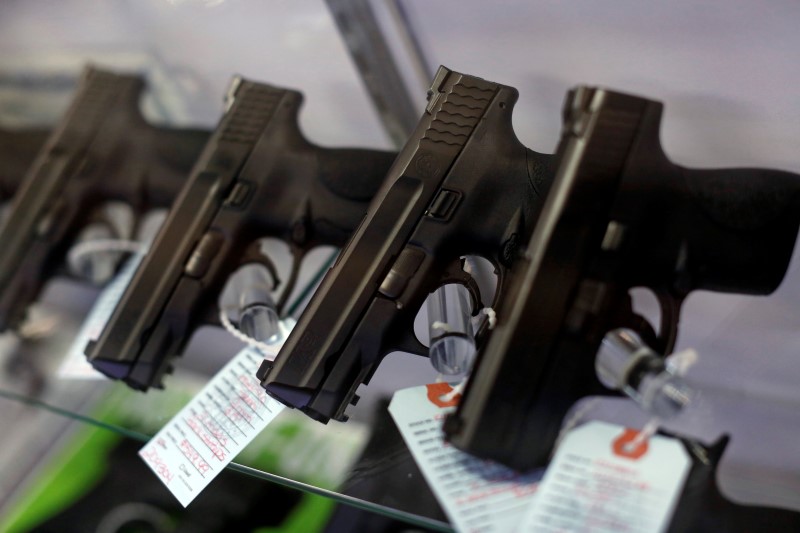By Robert Iafolla
(Reuters) - President Barack Obama is expected to announce new gun control curbs this week, but he will have to decide whether to take bold action that would likely spark a major legal challenge from opponents or a more cautious route that may be less effective, legal experts said.
Obama, who has expressed deep frustration about U.S. gun control regulations after a series of mass shootings at schools and other places during his presidency, said he will meet U.S. Attorney General Loretta Lynch on Monday to discuss gun control measures that do not require congressional approval.
The president said in his weekly radio address on Friday he has received "too many letters from parents, and teachers, and kids, to sit around and do nothing" about the issue.
The Washington Post and Politico reported late last week that one of Obama's main proposals would require some unlicensed gun dealers to get licenses and conduct background checks on potential buyers. Current law exempts smaller dealers who often operate at gun shows and sell online.
Obama, who has been thwarted by the Republican-controlled Congress in his push for tighter gun control legislation, could act through an executive order, which would be immediate and carry the force of law. It would also almost certainly prompt lawsuits by gun advocates claiming the president lacks the authority to change the legal definition of who must obtain a dealer's license.
The conservative advocacy group Freedom Watch plans to sue to block any executive order on gun control, Larry Klayman, the group's general counsel, told Reuters on Sunday.
An executive order would draw immediate comparisons to Obama's initiative aimed at protecting five million undocumented immigrants from deportation. Challengers sued and won an injunction that blocked the move. The administration has asked the U.S. Supreme Court to take up that case.
GUIDANCE NOT BINDING
Obama could take the less risky path on guns by directing the Bureau of Alcohol, Tobacco, Firearms and Explosives (ATF) to redefine its guidance on who is considered a dealer under federal gun law. This would be advisory and lack the force of law, which would mean that prosecutors could not rely on it when pursuing small gun dealers.
"The guidance could be used as evidence that prosecutors made a reasonable interpretation that a dealer needed a license, but it's not binding," said James Jacobs, law professor at New York University and author of the 2004 book "Can Gun Control Work?"
"In a way, it's more like a speech, like the head of the ATF saying who needs a federal dealer's license," he said.
Obama could choose an even more cautious route and direct the ATF to begin the formal administrative rulemaking process to change its regulations for who is considered a firearms dealer under the existing Gun Control Act. Agency action that includes the chance for public comment would create an enforceable rule that would likely pass legal muster, but that process probably would not conclude before Obama leaves office in January 2017.
Lawmakers could still try to block such ATF rulemaking by denying the agency funding, particularly funds for enforcing the rule if it was passed in the face of congressional opposition.
Already some Republican candidates seeking the party's nomination to be its presidential candidate in the 2016 election, including frontrunner Donald Trump, said they would overturn any gun control measures by Obama if they get into office.
Still, the President should be on firm Second Amendment ground if he pushes for a widening in the way the current law is applied, legal experts said.
"There are very few things I'd say with 100 percent certainty about what the Supreme Court and other courts would do, but I'm 100 percent certain that no court would say requiring more background checks violates the Second Amendment," said Stanford University law professor John Donohue.
The Second Amendment of the U.S. Constitution protects the right of Americans to keep and bear arms.
Regardless of what steps Obama might take to increase the number of dealers who must conduct background checks, legal experts said that he cannot accomplish his desired gun control agenda - like boosting oversight of gun show sales - through executive action alone.

"This won't really close the gun-show loophole, it will only narrow that loophole," said Adam Winkler, a law professor at UCLA and author of Gunfight: The Battle Over the Right to Bear Arms in America. "This is going to marginally increase the number of people who have to get a license."